Mt Parnitha: The Great Refuge
Just 40 minutes from the heart...
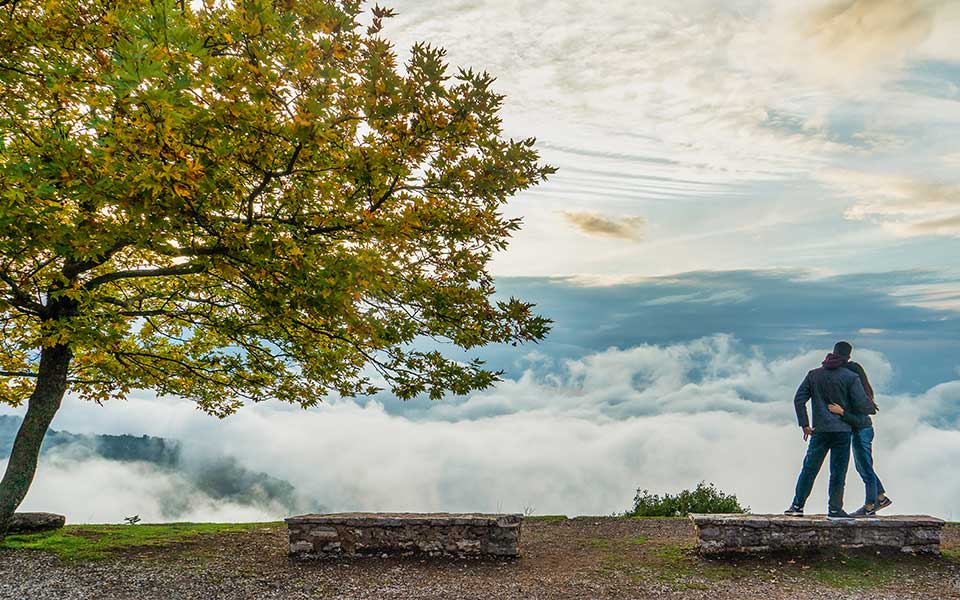
From the scenic outlook of Tsagaralona you can enjoy panoramic views of Lake Kremasta, at least when it’s not obscured by clouds.
© Perikles Merakos
“If you deconstruct Greece, you will in the end see an olive tree, a grapevine, and a boat remain”, wrote Odysseas Elytis. If you deconstruct Megalo Chorio in the region of Evrytania, what will remain? Stones, springs and forests. This is the distillate of one of the best-known destinations in central Greece, a village with stone houses on the banks of the Karpenisiotis River, at an elevation of 720 m on the slopes of Mt Kaliakouda.
Despite its name, which literally means “Big Village,” Megalo Chorio is not actually that… big. It has a central road with tourist shops, and you can easily walk from one end to the other in 15 minutes. It is, however, certainly picturesque and characteristic of the proud grandeur of Greece’s mountainous regions, with its eye-catching Church of St. Gerasimos, its large square dominated by the tall tower housing a clock brought here in 1926 by residents of what was then Constantinople who hailed from the village. (The clock was hit by bullets during WWII.)
If you take the narrow alleyway behind the clock tower, you’ll find yourself on an old cobblestone path, a reminder of what other roads in Megalo Chorio would have looked like before they were covered with asphalt. What is particularly striking here is the architectural continuity – you simply do not notice as the cobblestone road morphs into a garden wall and then the wall of a house. There is no other building material to be seen, just stone.
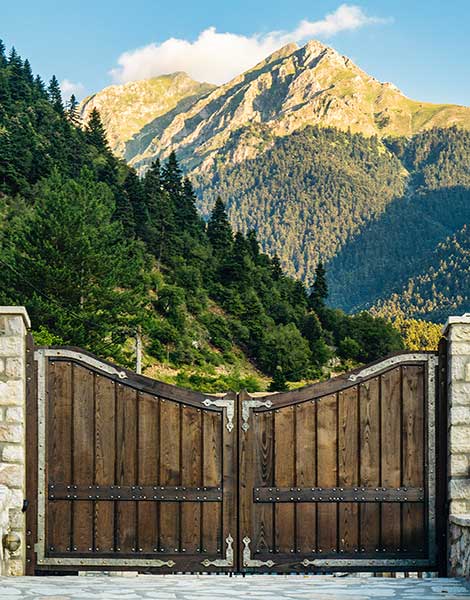
Megalo Chorio, embraced by the mountains of Evrytania.
© Perikles Merakos
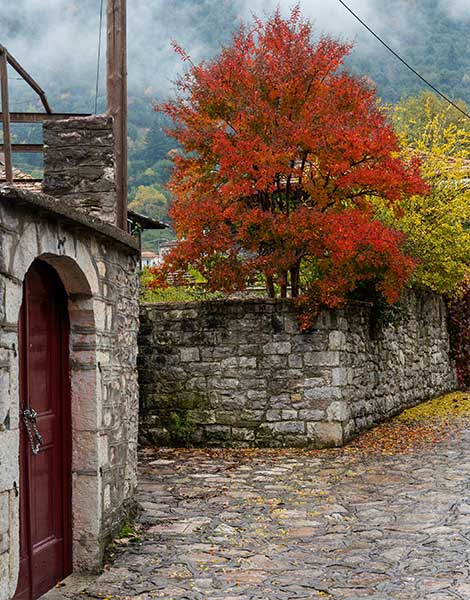
© Perikles Merakos
If, after viewing the clock tower, you wish to see the original mechanism of the clock (replaced by an electronic one in 1988), stop by the Folklore Museum, where it’s on display. The museum has been put together with great love and care, as is immediately apparent from the wealth of exhibits and the way that information is communicated to the visitor. Founded by the Association of Megalochorites of Constantinople, it is housed in an old mansion and – apart from the clock mechanism – its exhibits include hand carders, distaffs, swingles, crocks and coffee grinders.
The museum also showcases traditional occupations such as that of the cobbler, the woodcutter and the beekeeper, while paying homage to individuals who left their mark on Megalo Chorio as well, including the artist and photographer Aristeidis Laios, as well as the journalists and publishers Andreas and Dimitris Pournaras.
However, the person who made the biggest impression on us when we visited Megalo Chorio was neither an artist nor literary figure, but a woman wearing a traditional headscarf who, from her balcony, was using a hose pipe to wash a crate of potatoes in the yard below: village life in all its simplicity and freedom! We saw this wonderful lady near the spot known locally as Kefalovryso, from where we followed a forest path that took us past springs and over small wooden bridges. It’s only a short walk, less than 10 minutes, but it will take you through one of the most beautiful locations in the vicinity of Megalo Chorio. You can either follow the path downwards from Kefalovryso, or upwards, starting at the parking area where you’ll see a signpost for the “Mylokalanos Path”.
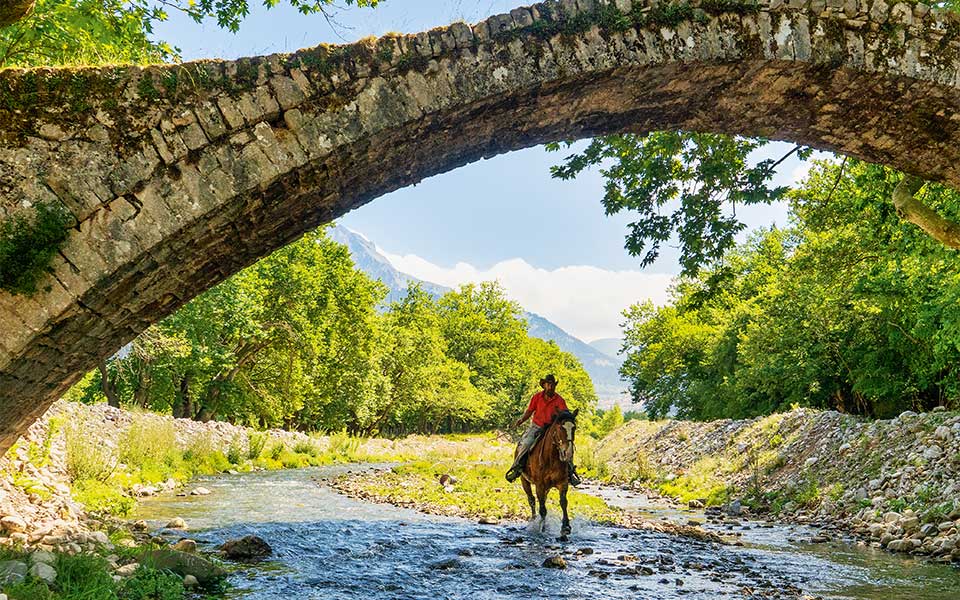
Horseback riding with Saloon Park guides at the old stone bridge of Xerolithos, which spans the Karpenisiotis River.
© Perikles Merakos
The great advantage of Megalo Chorio – which lies just 13 km from Karpenisi – is that it provides the perfect base for discovering the many natural attractions of the regional unit of Evrytania. Here, nature is the star attraction. In winter, however, not everywhere is suitable for exploration (one example being the celebrated Panta Vrechi Gorge). It’s best to adjust your activities to the prevailing weather conditions and, for extra safety, to contact one of the local outdoor activity companies before setting off to places you don’t know. We got to know Evrytania’s stunning nature on a long excursion organized by F-Zein Active. We set out from Karpenisi in the direction of Proussos, stopping first at Kleidi, just after the village of Gavros. Here, the sights are stunning: nature and man coexisting in harmony, with the towering rock dug out at the bottom for the road to pass. Running alongside is the Karpenisiotis River, with plane and kermes oak trees all around.
A little further down the road is a place called Patimata tis Panagias, where shapes of different colors on the rock face are believed by many to be footprints left by the Virgin Mary. There is a ladder used by the faithful to climb up and leave a votive rosary, or “whatever pops into their heads” according to the locals, who appear to be telling the truth, as you’ll see bracelets inlaid with pearls, with shells, and even with plastic, along with anything else you might imagine.
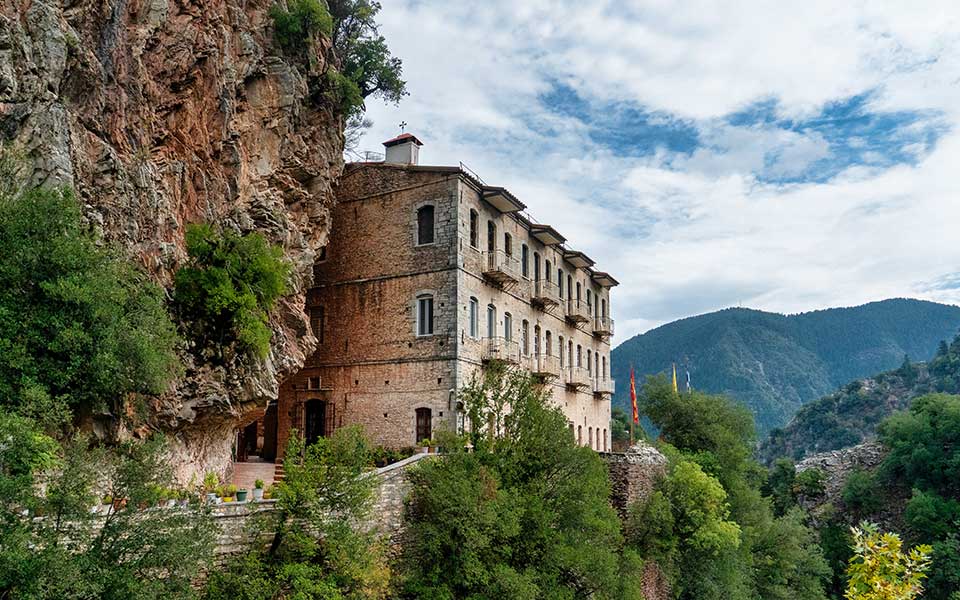
Proussos Monastery, the most important pilgrimage destination in Evrytania.
© Perikles Merakos
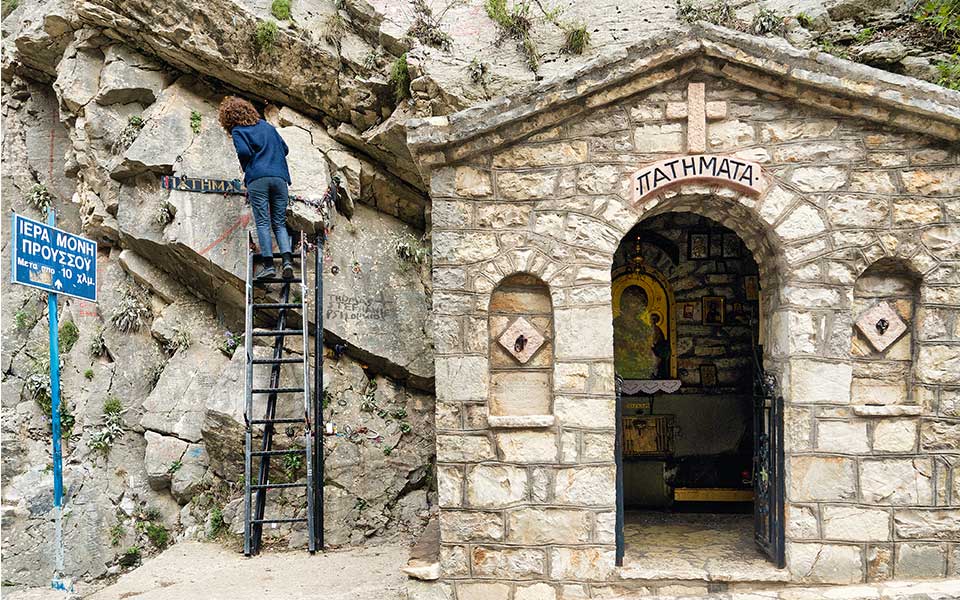
"Patimata tis Panagias"
© Perikles Merakos
Continuing down the road, you’ll reach Dipotama (the place where the Karpenisiotis and Krikelopotamos rivers meet and form the Trikeriotis) and, shortly after, the Proussos Monastery, a major pilgrimage destination in Greece, which also has a small museum of religious and historical artifacts, including the armor and weapons of the revolutionary hero Georgios Karaiskakis. The monastery occupies an idyllic location in an area abounding with wildlife, including roe deer, wild boars, hares, partridges and blackbirds. The excursion then takes us to the facilities of the Stremenos cold cuts company, before we embark on a short hike to the Black Cave. It’s only 2 kilometers there and back, and the trail is of moderate difficulty but very popular, winding past waterfalls and through dense woodland of plane trees, holm oaks and firs. Had there been fewer people on the path, it would have been sheer magic.
To round off the trip, we carried on to the village of Velota (for a meal), and then down the banks of the Trikeriotis (for a riverside stroll). From here we sought out the scenic outlook of Tsagaralona (for an incredible view of Lake Kremasta, the largest artificial lake in Greece), and Fidakia (an attractive stone-built village offering a sense of tranquility verging on perfection). In a word, it was a very full excursion that served as an enjoyable introduction to the diversity of the region’s natural heritage: its rivers, lakes, caves, forests and trails.
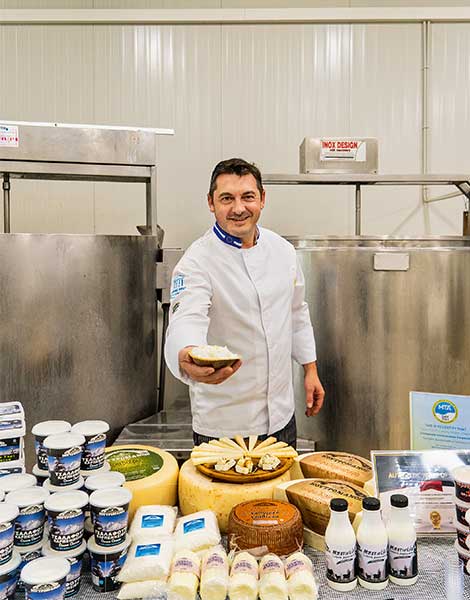
Koutromanos Cheese Dairy
© Perikles Merakos
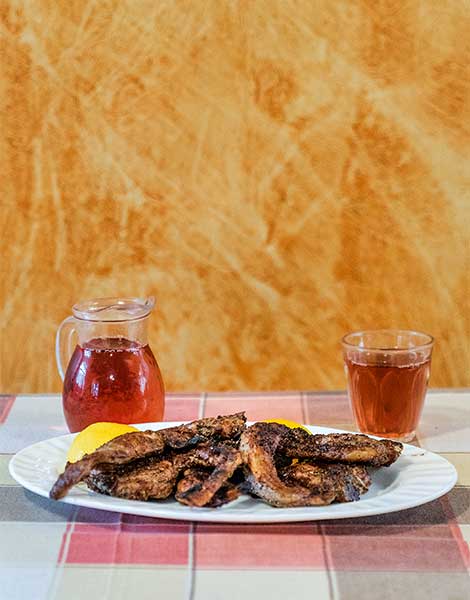
O Thanasis
© Perikles Merakos
The second big attraction of Evrytania, after its spectacular natural landscape, is its diverse local cuisine. Avid foodies, the region’s inhabitants show a clear preference for meat, but they also create top-quality cheeses and homemade pasta. There are a number of production facilities open to visitors and, of course, many tavernas. These places are worth visiting not only for purely gustatory reasons, but also because the producers and restaurateurs you talk to will give you a clearer understanding of what makes Evrytania so special. There are no better tour guides than these people, who are the vital link between visitors and the destination. What you will immediately discern in your interactions with these representatives of Evrytanian gastronomy is a deep love of tradition, not only in terms of dishes (there is some experimentation, though not a lot), but also in how the food is prepared. You’ll see countless examples of mothers, daughters, sons and fathers working side by side in the kitchen, in the time-honored custom of small and medium-sized Greek enterprises.
Whether family-run or not, nearly all the local businesses that we visited had one thing in common… good food, which is why a culinary tour will not disappoint. Our first tasting session took place at the Stremenos cold cut facility, located in a place of outstanding natural beauty, full of fig, apple, walnut, cherry and wild chestnut trees. Its founder, Christos Stremenos, passed away two years ago, but the new owners are striving to maintain the high standards he set. In addition to their celebrated handmade prosciutto, you’ll find lonza (naturally cured pork tenderloin), black pork salami, bacon and sausages. Treat yourself to a selection of delicious cold cuts and tsipouro (a local spirit) at the outdoor wooden pavilion.
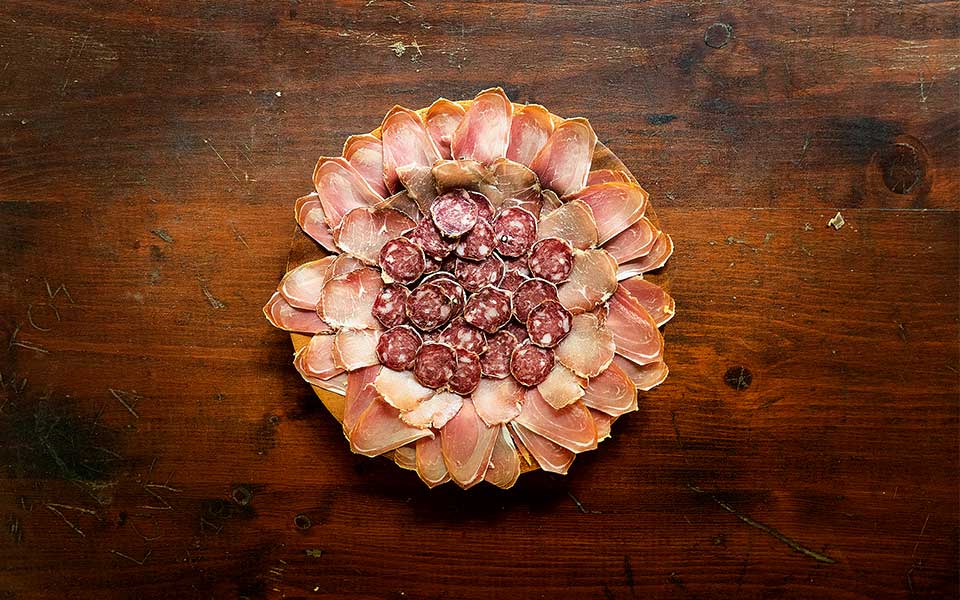
Charcuterie at the acclaimed Stremenos cold cut facility.
© Perikles Merakos
Another stop you mustn’t miss is Kreopoleio 52, just outside Karpenisi. To describe it as its sign does, as “a third-generation butcher’s shop that first opened in 1952” in no way does it justice, since it’s more like a New York meat boutique that suddenly appeared in Evrytania. This shop, run by Vangelis Mavraganis, grandson of the founder, makes an immediate impression with its meat-cleaver door handle. Inside, you’ll find a vast selection of charcuterie and other meat products (be sure to try the sausage-like boubari, a Christmas delicacy), eggs and honey, tsipouro and Carpinus beer from Karpenisi.
Fish lovers should head to Fresko, a vertically integrated production facility at Gavros, not far from Megalo Chorio, with a fish farm, smoking room, trout packing unit and taverna. Apart from learning how the fresh water fish are farmed, you’ll also have the opportunity to sample some quite unusual snacks, including trout soutzoukakia and giouvarlakia, and perhaps buy some smoked trout fillet marinated in oil, lemon and pepper.
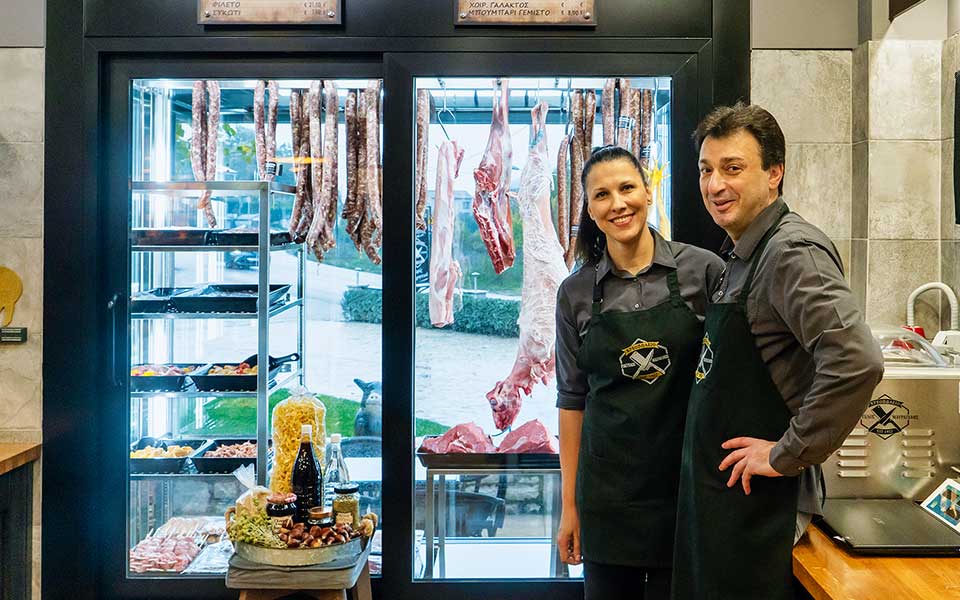
Kreopoleio 52
© Perikles Merakos
In Megalo Chorio itself, two stores – located just a minute’s walk from each other – have chosen slightly different gastronomic paths. Evryti is a Social Cooperative Enterprise that processes locally sourced raw materials (from farmers, beekeepers and small-scale superfood producers). The attractive shop has the air of a city delicatessen and sells a variety of products ranging from chestnut chutney and Cornelian cherry liqueur to chokeberry jam and wild cherry preserves. At the store named Megalo Chorio, Christos Karipis will help you find marmalades and preserves as well, but there are also many kinds of homemade pasta, orzo, tarhana and noodles on hand.
We’ve left the cheeses for last. Ilias Koutromanos, a third-generation cheesemaker, produces feta, goat’s cheese, different kinds of graviera (including a smoked variety and one made with boukovo), kefalograviera, sour-milk cheese, goat’s butter, yogurt, rice pudding and, of course, tsalafouti, the celebrated cheese of Evrytania which is hoping to be awarded a place among PDO products. The tsalafouti made by Koutromanos participated in the Mediterranean Taste Awards 2021 and, after a blind taste test, took home the Gold Award in the Creamy Sheep’s Cheese category. At his store in Karpenisi, you can sample some of the fine products he makes.

Cycling up the stone-paved streets of Megalo Chorio against a backdrop of dense forest.
© Perikles Merakos
In addition to production facilities that are open to visitors, Evrytania also offers many good tavernas and restaurants, often in places where gourmet cuisine is the last thing you’d expect to find. One example is the restaurant Stin Poly, in the village of Palio Mikro Chorio, which was opened by Poly and her family (who came here from Istanbul) over three years ago. Quite different to the other restaurants we visited, it serves Mediterranean cuisine with a twist. Dishes include nettle soup and sweet potato soup, but the standout is the beef tenderloin with demi-glace sauce, a challenge for even the most skilled and patient chef.
Offering more traditional fare, To Perasma is a taverna with stone walls and a wood-burning stove that warms body and soul. It’s located in the village of Velota, not far from Lake Kremasta, and provides stunning views of the mountain ranges of Panaitoliko, Kaliakouda, Helidona and Agrafa. The eatery offers a wide choice of pork, lamb, goat and poultry dishes, and sources some of the ingredients from its own vegetable garden and chickens coops. A similar atmosphere prevails at the two classic eateries in Megalo Chorio. The grill house O Thanasis has an inviting covered yard and satisfies the appetites of demanding meat lovers with lamb cutlets, skewered pork and beef patties. The Agios Athanasios taverna (with a playground to please the children) serves rooster in red wine sauce, tender veal in a clay pot, spit-roasted meats, soups, savory pies and other hearty winter dishes. On one wall there are photographs from wild boar hunts, showing the dead animals laid out in front of the hunters. Although some might find the images distressing, they do capture a very real aspect of country life and of attitudes towards hunting in rural areas.
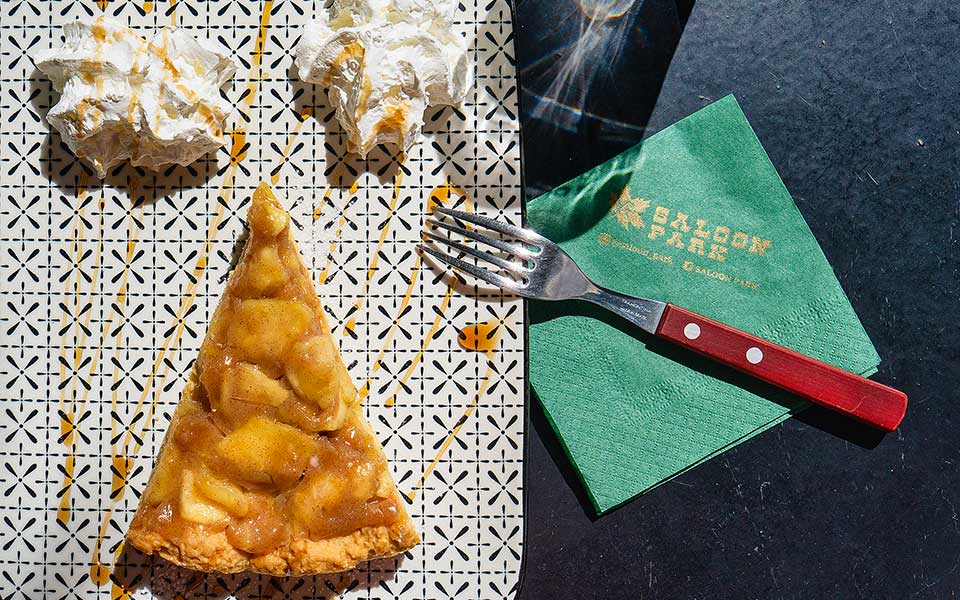
Saloon Park
© Perikles Merakos
In Evrytania, locals are also very partial to dessert dishes and other sweets, especially those that are handmade, often by someone who makes them for their small family business. You’ll find lovingly prepared galaktoboureko (semolina custard baked in filo) and ekmek kataifi (a three-layer delight of syrupy shredded filo, custard cream and whipped cream, usually topped with pistachios and cinnamon) at the two shops belonging to the Karvelis family, To Rakomelo and To Galaktoboureko tou Karveli (the latter is also known Kyra Paraskevi’s Café), which just happen to face each other in Megalo Chorio.
Polite and friendly, the Karvelis family will be happy to tell you all about the region and the building that now houses the coffee shop, which once served as the local lock-up and then as a combination barbershop- taverna. At the small tables of the café-restaurant Antigoni in the village’s lovely square, you can savor preserves and baked sweets, while specialties at To Paramithi nearby include walnut cake, baklava, cake roll and a cheesecake containing bits of wild cherry. If you find yourself in the village of Fidakia, either on an organized excursion or while exploring independently, make a stop at the taverna Oichalia where, in addition to their main dishes, you can also enjoy mouthwatering sweets that are the perfect accompaniment to a leisurely Greek coffee or hot chocolate.
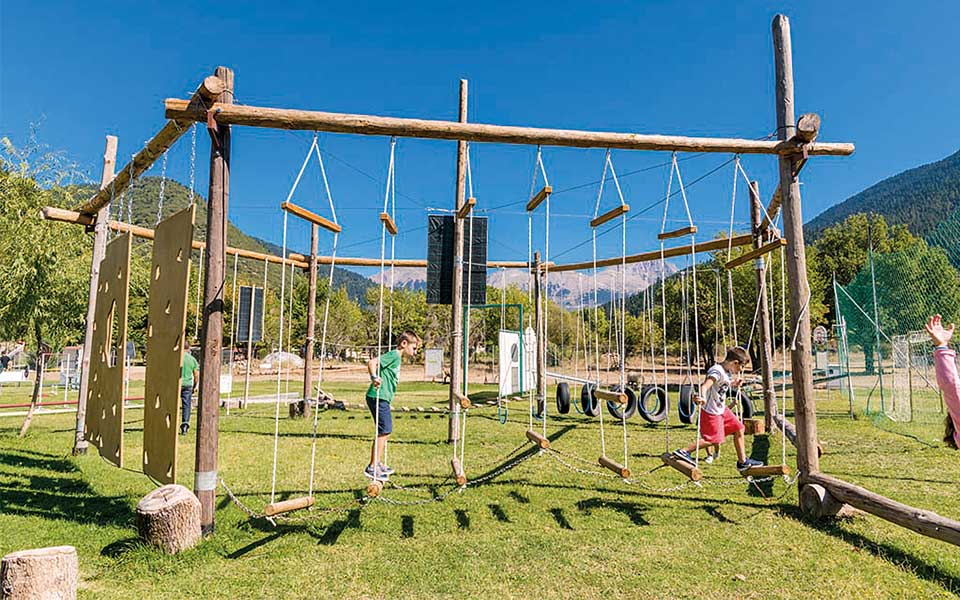
Games for all the family, based on Newton's laws of physics, at The Newton Park.
© Perikles Merakos
Evrytania is an ideal destination for families with young children, not only on account of the rich diversity of its natural beauty, but also because of the opportunities it offers for fun and games. Two destinations for these are Saloon Park and The Newton Park, located just a five-minute drive from each other between Karpenisi and Megalo Chorio. At Saloon Park (Tel. (+30) 22370.246.06) you can try your hand at horseback riding, accept the challenges of the zip line or the 10-meter climbing tower, or put your archery skills to the test, while can paddle a canoe, dash around a wigwam or take a Wild West train ride.
At The Newton Park (Tel. (+30) 22370.246.14, €6) they can learn while playing and play while learning. The park is dedicated to Sir Isaac Newton who, along with Galileo Galilei, is considered by many to be the father of modern science. After reading about Newton’s Laws, you can then experiment with the games that are based on his discoveries (such as the disc with seven different colors which, when rotated, looks grayish-white), as well as other devices that explain in practice the ideas of great scientists (including the Foucault pendulum and the Archimedes pulley).
GETTING THERE
Megalo Chorio is 296km by road from Athens (3½ hours) and 325km from Thessaloniki (4 hours). Expect to pay around €45 to €50 for fuel and tolls (one way).
ACCOMMODATION
Megalo Chorio offers a choice of accommodation, including Anerada Inn Boutique Hotel (Tel. (+30) 22370.414.79, from €110/double room), a pet-friendly establishment with five rooms and a garden house, which also serves a hearty brunch, and Forest Suites (Tel. (+30) 22370.411.55, from €85/double room), with eight suites, two rooms and a stunning view of Mt. Helidona. In the capital of the Evrytania region, Karpenisi, one value-for-money option is Lecadin Hotel (Tel. (+30) 22370.221.31, €50/double room), which also affords wonderful views. Another good choice is Ninemia (Tel. (+30) 22370.246.14, from €150), a family hotel in The Newton Park, which has two bungalows, two maisonettes, a superior suite (for 4-8 persons) and a double room for 2-3 guests.
TIPS
ACTIVITIES
Apart from F-Zein Active (Tel. (+30) 22370.801.50), outdoor activities are also organized by Trekking Hellas – Evrytania (Tel. (+30) 22370.259.40).
USEFUL ADDRESSES
In Megalo Chorio
Outside Megalo Chorio*
* Distances are by road from Megalo Chorio.
Just 40 minutes from the heart...
A challenging summer ride across the...
The imposing mountain range of Agrafa...
From the salt-sprayed islands to the...